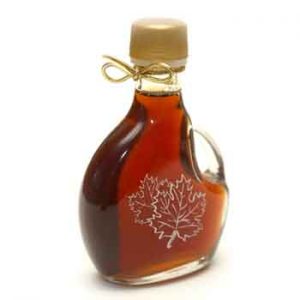
More evidence that low-calorie sweeteners are bad for your health
Studies show that artificial sweeteners can raise the risk of hypertension, metabolic syndrome, type 2 diabetes and heart disease, including stroke.

Natural Health News — New research suggests a natural way to cut down on antibiotic use without sacrificing health: a maple syrup extract that dramatically increases the potency of these medicines.
Although antibiotics can be lifesavers, they come with a price. High doses can kill healthy cells along with infection-causing bacteria, while also increasing the incidence of “superbugs” that no longer respond to known antibiotics.
“Native populations in Canada have long used maple syrup to fight infections,” says Nathalie Tufenkji, Ph.D from McGill University in Montreal. “I’ve always been interested in the science behind these folk medicines.”
A few years ago, we reported that the phenolic extracts from maple syrup had antibiotic synergy, so they were able to synergise with antibiotics in such a way that you could use a lot less antibiotics to get the same kill effect of bacteria,” said Tufenkji. “We did this with several different bacteria and essentially we had found that these phenolic compounds made it easier for antibiotics to get inside the bacteria…so the antibiotics had more of an effect.”
» Previous studies have shown that maple syrup extract can work synergistically with antibiotics to kill bacteria.
» In a new series of trials in the lab and on insect models Canadian researchers have shown that this effect is the result of the maple syrup extract changing permeability of bacterial cells, exposing the bacteria to more antibiotic.
» The maple syrup extract improved the efficiency of antibiotics by up to 90%.
90% more efficient
They exposed several disease-causing bacterial strains to the extract, but they didn’t see much of an effect. Rather than give up on maple syrup altogether, Tufenkji decided to check whether the extract could enhance the antimicrobial potency of the commonly used antibiotics ciprofloxacin and carbenicillin.
When her team mixed the phenolic extract with either of these medicines, they indeed found a synergistic effect, allowing them to get the same antimicrobial effect with upwards of 90% less antibiotic.
The approach worked on a variety of bacterial strains, including E. coli, which can cause gastrointestinal problems; Proteus mirabilis, responsible for many urinary tract infections; and Pseudomonas aeruginosa, which can cause infections often acquired by patients in hospitals.
Building on this work, Tufenkji’s team next tested the extract in fruit flies and moth larvae. The researchers dosed insects’ food with pathogenic bacteria and antibiotic, with and without the maple syrup extract. Flies and moths consuming the maple syrup extract lived for days longer than those that did not.
Changing cell structure
Further experiments showed that the extract helps antibiotics work better, says the team, by increasing the permeability of the bacteria. This means that drugs gain access to the interior of bacterial cells. There is also the possibility that the extract may work by a second mechanism as well, disabling the bacterial ‘pump’ that normally removes antibiotics from these cells.
The new research is timely. In February, the World Health Organization released a list of the top 12 superbugs they’re running out of ways to treat. If further studies show that maple syrup boosts the effects of antibiotics in future studies, however, it could help with the superbug problem – especially since Tufenkji says it’s unlikely the bacteria would become resistant to the maple syrup.
The researchers presented their work, ahead of publication, at the recent 253rd National Meeting & Exposition of the American Chemical Society (ACS).
While it is likely to be years before we see doctors prescribing maple syrup extract alongside antibiotics Tufenkji says, she’s hopeful that this approach may have an edge over other would-be medications thanks to its source. “There are other products out there that boost antibiotic strength, but this may be the only one that comes from nature,” she says.

Please subscribe me to your newsletter mailing list. I have read the
privacy statement